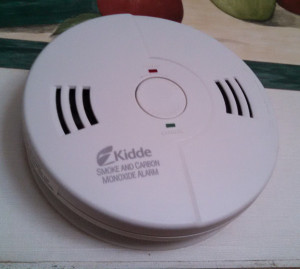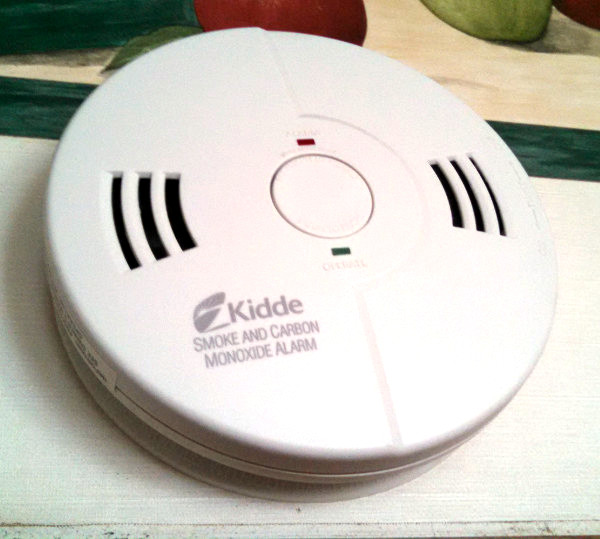Must a landlord put smoke/CO alarms in their apartments?
| . Posted in advice - 16 Comments
Answer: Yes, a landlord must have hard-wired fire alarms in the common areas, and also, smoke detectors inside individual dwelling units.

Proof:
The state sanitary code says "see the fire regulations":
410.482: Smoke Detectors and Carbon Monoxide Alarms
(A) Owners shall provide, install, and maintain in operable condition smoke detectors and carbon monoxide alarms in every dwelling that is required to be equipped with smoke detectors and carbon monoxide alarms in accordance with any provision of the Massachusetts General Laws and any applicable regulations of the State Board of Fire Prevention (527 CMR), State Board of Building Regulations and Standards (780 CMR), or the Board of Examiners of Plumbers and Gas Fitters (248 CMR).
The fire regulations are split into multiple parts.
Carbon monoxide detectors are required if there's gas burned in the building or if there's indoor parking, see section 31.04:
Smoke detectors are required in all the locations written out here, see 24.07(2). This includes protecting bedrooms inside each dwelling unit.
The only exception seems to be for studios, where you can put a detector in the stairwell for some reason.
Extra:
Landlords can require tenants to maintain the smoke detectors if it's written in the rental agreement. There are new smoke detectors with tamper-proof ten year batteries. These should be installed anywhere tenants are not reliable when it comes to replacing batteries. Many tenants will remove the batteries from a beeping detector and just operate without this life-saving equipment.
As a landlord you want to protect tenants who don't know better by making smoke detector sweeps (always give notice) or installing these tamper-proof or hardwired devices.
What Kind of Smoke Detectors and Carbon Monoxide Detectors do Landlords need to Provide?

New Mass fire code effective December 1, 2016 requires landlords to update their units.
Landlords need to know what kind of smoke detectors and carbon monoxide detectors to install in their units. Remember that just because they were legal yesterday doesn’t mean they’re legal today! Here is part of the new Mass fire code effective December 1, 2016:
13.7.5.1.1 Nonrechargeable, Nonreplaceable Battery Power Alarms/Detectors
(1) Photoelectric technology shall be required for smoke alarms and detectors
(2) A silence button shall be required on each alarm and detector device within its control panel
(3) Each smoke alarm and detector device shall be equipped with a nonrechargeable battery
(4) Each smoke alarm and detector device shall be equipped with a nonreplaceable battery
(5) All power requirements for all smoke alarms and detectors are met for at least 10 years of
battery life, including weekly testing.
(6) All power requirements for combination alarms with smoke/carbon monoxide shall be
capable of powering the unit for its service life, including testing.
In plain English: anywhere you have smoke detectors or a carbon monoxide detector, they must have a 10-year permanent battery. Also, note that ionization smoke detectors are no longer counted. Smoke detectors must use “photoelectric technology.”
On the one hand, this is bad news, because photoelectric smoke detectors are expensive, and the sudden change in Mass fire code might mean they’re going to be expensive for a while.
On the other hand, ten year batteries are good for landlords. How many times have we cleaned up after a tenant move-out only to find one or all of the smoke detectors batteryless and thrown into a closet? Chirping detectors are an annoyance, especially in the middle of the night. Ten year batteries help us all stay a little safer with a little less work and nuisance.
So pay attention to the new Mass fire code for smoke detectors and carbon monoxide detectors! The lives of your customers depend on it!
Smoke Alarms vs. Fire Detectors: Which do you need, and why?
As you may have guessed, smoke alarms and fire detectors are two different things that serve two different functions. What you need depends on whether your rental unit is a single family home or a multi-unit operation.
Smoke alarms are what most people think of when they think about fire safety. The classic design is a white circular object with a red light that mounts to the ceiling. Though a smoke detector may look different from that (an increasing number of design options are available for purchase), all of them perform the same function: A smoke detector senses smoke and sounds an alarm. A smoke detector may operate on its own or may be integrated into a larger safety system that includes a fire alarm.
A fire alarm is triggered by a smoke detector going off. It sounds an alarm that alerts everyone in the building to evacuate. Each smoke detector in the building is wired into this system, and may or may not sound its own alarm as it activates the fire alarm.
What you need in your rental unit depends on its size and the year it was built. For one- and two-family units that received their building permit after 1975, smoke detectors must be hardwired to each other (if one goes off, they all go off), among other requirements. Homes built later in the twentieth century (for example, after 1997) through 2011 have even more stringent requirements for smoke and heat alarms.
Related Pages:
From installing the right detectors to making sure renters don't pull them down, helpline callers can get business advice from experienced owners and managers.




